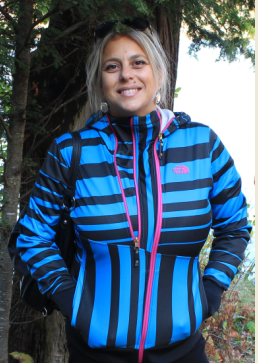Your Stories
Heart Failure after Pregnancy

Here is my real story…. just days after delivering my third child and being discharged from the hospital, I literally could not make it up the stairs. I was rushed to my local clinic, almost to be turned down as it was nearly closing time, but someone was looking over me, and I was seen. I remember the doctor telling me that it is never normal to have shortness of breath. He immediately asked where I gave birth and called the ambulance to transport me.
I landed back at Civic emergency, It was a long ride, I recall waiting in the hallway for a room and literally feeling like someone had their hands on my head, pushing me further and further down in a sea of water. I later learned that I was actually drowning in my own fluid.
When I got to be seen, I heard lots of movement around me, immediately a portable x-ray machine showed up in my room, and I was medicated with pills and patches to lower my blood pressure. I was also given diuretics and surges of oxygen were pushed down my lungs to help me breathe. I remember a group of doctors surrounding me from various specialties just watching. I still have an image of them, some with hand over mouth, almost in disbelief. I was later told how lucky I was that I made it back to the hospital, as I had 2.5 litres of fluid build-up in my lungs alone.
I was then moved to intensive care and underwent rigorous tests to determine the root cause of my problem, and waited for results while trying to stabilize on a cocktail of medication. The diagnosis was severe heart failure. I was told I would be contacted by the Ottawa Heart Institute. Just hearing those words alone and waiting for that appointment, I thought I was doomed but when I think back, and after everything I have learned, I was actually lucky.
My heart had become enlarged and unable to pump sufficient blood to support the body, it was pregnancy induced. This condition is known as Peripartum or Postpartum Cardiomyopathy (PPCM). It is really a silent killer, with no prior history of heart disease a women’s heart can go from healthy to deterioration in a very short time. It often goes undetected as symptoms typically related to pregnancy can easily mask this condition, such as swelling, shortness of breath, unexplained coughing, and heart palpitations. Many, like myself, will have their symptoms dismissed as normal signs of pregnancy.
I later learned that this real but rare condition can affect 2 in 10,000, sometimes, with unfavourable outcomes such us never gaining normal heart function, requiring a defibrillator, or transplant. Truth be told, some women are not diagnosed until after they have suffered a cardiac arrest or death.
With the aid of lifestyle changes and medication, it took several years after diagnosis for my heart function to fully improve. Under the watchful eye of my cardiologist, my condition is presently stable. Currently, I am monitored by receiving regular follow-up care and testing. I frankly do not have enough words to thank the Ottawa Heart Institute for their optimal treatment. It is a first class facility, a powerhouse of experience, diagnostics and knowledge, dedicated to their cause. And well, they just care.
I was also referred to and utilized various facets and programs in place at the Ottawa Hospital, whether it be cardiac rehabilitation, weight management, and nutritionists. I cannot lose sight of the fact that I have to do my part in all this too. For those who did not know that pregnancy could cause heart failutre, there you have it.
Communicate with your doctor and know when to seek medical help, as early detection is key. I'm sharing to raise awareness.
- Marian Naoufal
The year following a heart transplant is a rough one
I am a 47–year old wife, mother, teacher, athlete and frequent flyer at the Heart Institute. My problems began about three years ago when my heart was attacked by an inflammatory disease called sarcoidosis. This is an obscure disease and can be difficult to detect. By the time a diagnosis was reached and the disease treated, the damage to my heart was done. I had conduction problems including heart block and ventricular tachycardia (heart racing). I also had cardiomyopathy (dilated heart muscle). Ultimately, I was left with heart failure and a persistent and unmanageable arrhythmia.
After having an implanted cardiac defibrillator, a variety of medications and a nine-and-a-half hour ablation, my cardiologists came to the conclusion that a heart transplant was the only option left. After some testing and a relatively short wait in hospital (5 weeks), I was thrilled to receive a donor heart in April, 2013.
The year following a heart transplant is a rough one. I’ve had side-effects from medications, issues with bones healing, rejection and infections as well as two embolisms following the surgery. Having said that, I also have a renewed chance to live my life. I’ve managed to return to some of my former activities of x-country skiing, swimming, cycling and some running (really slow running). Perhaps most importantly, I am, once again, able to play tag with my six and nine-year old children.
It’s been a stressful experience these past few years but I’m thrilled to be under the care of the amazing staff at UOHI. Their care cannot be understated and I can’t imagine going through all of this without their constant support, knowledge and compassion. I’m happier still, to be living an active life once again and having confidence back in my state of health.
- Taunia Curtis – May, 2014
Climbing Mount Kilimanjaro for Healthy Hearts

Ten courageous women from all parts of Canada will be climbing Mount Kilimanjaro to raise money for the Heart Institute's First Canadian Women Heart Health Centre. The climb will take place over 9 days between June 23 and July 1, 2014. Climbers will be in Tanzania for approximately 15-17 days.
Meet the Team, make a donation and follow their progress on the Heart Institute blog.
Roxy Hamilton

In my early 50's I was diagnosed with high cholesterol and put on medication. This was considered something to watch as my father had died at age 39 of a massive heart attack.
I continued to work full-time as a Program Manager in the Ontario Government but over the years I began to experience chest pain when going for a walk. In my late 50's I was diagnosed with stable angina and was prescribed Nitroglycerin. Stress and exertion increasingly caused my chest pain and in 2010 I was hospitalized with suspected unstable angina... a catherization showed that I had 60% blockages in two major arteries, along with other arteries with 30%.
Because the blockages were less than 70% my treatment was aggressive medication therapy. I completed the cardiac rehabilitation program at the Heart Institute at that time, which I credit with motivating me to establish a regular exercise regime. I was stable for the next two years with this treatment.
However, in 2013 I began to experience increasing difficulty with my exercise program with the new symptoms of shortness of breath, and jaw pain and fatigue upon less exertion. An early retirement at age 62 helped to reduce the stress of working life however, my symptoms continued. In January 2014, a second catherization showed progression of the blockage in my left artery to 80%, which was stented and most likely prevented an eventual heart attack. The success was immediate. I have renewed energy, am back on the treadmill meeting my exercise targets, and relatively symptom-free.
I continue to wonder why, out of my three siblings who are smokers, I, the one who never smoked, am the only one of us who has this disease. Genetics obviously plays a serious role. Interestingly, my doctors say that compared to my father who was a smoker, I have bought myself many years by following a healthy lifestyle.
Since my recent catheterization I have joined the Ottawa Heart Health Support Group which provides patient education through a monthly speaker series by Heart Institute specialists. I also look forward to participating in their new Women's Heart Health Centre initiative.
It’s often stated that women's symptoms are ignored by physicians as being heart related. The Ottawa Heart Institute is at the forefront of changing this trend for the benefit of all of us.
- Roxy Hamilton
My Story- by Marion Martell

At the time of my incident, I was 58 years old. Professional women, in good physical health, exercised regularly, ate well, not overweight, not on any medication, and never sick. It was May 2008, when I noticed that I experienced shortness of breath climbing hills at our golf course.
On Friday May 23rd, 2008 I was teaching a Communication Course at our local college. I had just started to deliver the afternoon component of the course when I did not feel well, short of breath, dizzy. I sat down- the next thing I knew someone was asking me about my heart rate. It was a paramedic. My normal heart rate was usually in the 50’s and my normal Blood Pressure is below 100. This time my heart was 43, (I was never that low). I was hooked up to a heart monitor. The Paramedic told me I was in Second degree Heart Block. Wow! I had already gone from First degree to second degree Heart Block. I knew I was in trouble. Things got worse…
I went from Second Degree Heart Block into Complete Heart Block. I was taken to the University of Ottawa Heart Institute where I stayed from May 23- May 29th. At first I was stabilized with a temporary Pacemaker and then I had surgery to have a permanent Pacemaker inserted to regulate my heart rate. With Heart Block there is a problem with the electrical conduction of the heart. Initially, I had one lead inserted, but it proved insufficient as I was still experiencing symptoms, shortness of breath, dizziness. In January 2009, I had a second lead inserted. This time I improved greatly, I was symptom free, back to feeling the way I did before my incident.
I had further studies done to determine the cause of my complete Heart Block. The Doctors were puzzled why I passed out and why I would require a pacemaker. I had genetic studies done at the Heart Institute. The outcome of the studies determined my heart block was idiopathic (no known cause).
Today I am 62 years old, life for me goes on as if nothing happened, and I remain as active as ever. I continue to work out on a very regular basis, golf, bike, walk, cross country ski.
Life is good, thanks to the University of Ottawa Heart Institute.
-Marion Martell
Anonymous
Carpe Diem
“You are going to need open heart surgery to replace your aortic valve within the next 6 to 24 months. In the meantime, no heavy lifting and only light physical activity. Keep any eye out for any of the symptoms we talked about. I will see you in 6 months”. The cardiologist’s words weighed heavily on me. How could this be happening? I am a 45 year old woman who had been leading a healthy and active life. With the exception of a ‘little heart murmur” from a very young age, I never really gave heart disease a second thought. You see, I don’t smoke, I am not overweight, my cholesterol levels are good, my blood pressure is normal and I eat well (with the exception of a little chocolate :)). Perhaps, I ignored some of the symptoms we discussed such as heart palpitations and extreme exhaustion. Isn’t this normal when we lead very busy lives?
I did undergo open heart surgery at the Ottawa Heart Institute a few years ago and was very grateful for the wonderful care I received and continue to receive. I have now learned to listen to my body as well as try and live “more” in the moment. I incorporate yoga and meditation into my weekly routine and I am learning when to say ‘no’. I understand that I will have to undergo another heart surgery one day. In the meantime, I know that by taking the best possible care of myself physically and mentally, along with knowing I have access to this world class Heart Facility, I will be better equipped to deal with what lies ahead.
Thank you for allowing me to share my story.
In the meantime, Carpe Diem!

